I am very new to C# and Visual Studio btw. What I am trying to do is that whenever I click a keyboard key my windows application disappears, and if I click the same key again it comes back. This OR that when I click the key it moves in the back of the programs that I have opened behind it, and if I press it again it moves infront.
Asked
Active
Viewed 77 times
0
-
2You can use RegisterHotKey to associate one or more Hotkeys to a Form or Thread (use the former). When the Hotkey is pressed, the Form (the handle) that registered the Hotkey is notified. See this, for example: [Capture a keyboard keypress in the background](https://stackoverflow.com/q/15413172/7444103). Then, determine the action to take when you receive the notification. – Jimi Jan 19 '20 at 14:25
1 Answers
0
I make a code example, which could show or hide the app when you click F10.
public partial class Form1 : Form
{
public Form1()
{
InitializeComponent();
}
KeyboardHook kh;
bool b=true;
private void Form1_Load(object sender, EventArgs e)
{
kh = new KeyboardHook();
kh.SetHook();
kh.OnKeyDownEvent += kh_OnKeyDownEvent;
}
void kh_OnKeyDownEvent(object sender, KeyEventArgs e)
{
if (e.KeyData == (Keys.F10) && !b) { this.Show(); }
if (e.KeyData == (Keys.F10 ) && b) { this.Hide(); }
b=!b;
}
private void Form1_FormClosing(object sender, FormClosingEventArgs e)
{
kh.UnHook();
}
}
public class Win32Api
{
#region
public const int WM_KEYDOWN = 0x100;
public const int WM_KEYUP = 0x101;
public const int WM_SYSKEYDOWN = 0x104;
public const int WM_SYSKEYUP = 0x105;
public const int WH_KEYBOARD_LL = 13;
[StructLayout(LayoutKind.Sequential)]
public class KeyboardHookStruct
{
public int vkCode;
public int scanCode;
public int flags;
public int time;
public int dwExtraInfo;
}
#endregion
#region Api
public delegate int HookProc(int nCode, Int32 wParam, IntPtr lParam);
[DllImport("user32.dll", CharSet = CharSet.Auto, CallingConvention = CallingConvention.StdCall)]
public static extern int SetWindowsHookEx(int idHook, HookProc lpfn, IntPtr hInstance, int threadId);
[DllImport("user32.dll", CharSet = CharSet.Auto, CallingConvention = CallingConvention.StdCall)]
public static extern bool UnhookWindowsHookEx(int idHook);
[DllImport("user32.dll", CharSet = CharSet.Auto, CallingConvention = CallingConvention.StdCall)]
public static extern int CallNextHookEx(int idHook, int nCode, Int32 wParam, IntPtr lParam);
[DllImport("user32")]
public static extern int ToAscii(int uVirtKey, int uScanCode, byte[] lpbKeyState, byte[] lpwTransKey, int fuState);
[DllImport("user32")]
public static extern int GetKeyboardState(byte[] pbKeyState);
[DllImport("kernel32.dll", CharSet = CharSet.Auto, CallingConvention = CallingConvention.StdCall)]
public static extern IntPtr GetModuleHandle(string lpModuleName);
#endregion
}
public class KeyboardHook
{
int hHook;
Win32Api.HookProc KeyboardHookDelegate;
public event KeyEventHandler OnKeyDownEvent;
public event KeyEventHandler OnKeyUpEvent;
public event KeyPressEventHandler OnKeyPressEvent;
public KeyboardHook() { }
public void SetHook()
{
KeyboardHookDelegate = new Win32Api.HookProc(KeyboardHookProc);
Process cProcess = Process.GetCurrentProcess();
ProcessModule cModule = cProcess.MainModule;
var mh = Win32Api.GetModuleHandle(cModule.ModuleName);
hHook = Win32Api.SetWindowsHookEx(Win32Api.WH_KEYBOARD_LL, KeyboardHookDelegate, mh, 0);
}
public void UnHook()
{
Win32Api.UnhookWindowsHookEx(hHook);
}
private List<Keys> preKeysList = new List<Keys>();
private int KeyboardHookProc(int nCode, Int32 wParam, IntPtr lParam)
{
if ((nCode >= 0) && (OnKeyDownEvent != null || OnKeyUpEvent != null || OnKeyPressEvent != null))
{
Win32Api.KeyboardHookStruct KeyDataFromHook = (Win32Api.KeyboardHookStruct)Marshal.PtrToStructure(lParam, typeof(Win32Api.KeyboardHookStruct));
Keys keyData = (Keys)KeyDataFromHook.vkCode;
if ((OnKeyDownEvent != null || OnKeyPressEvent != null) && (wParam == Win32Api.WM_KEYDOWN || wParam == Win32Api.WM_SYSKEYDOWN))
{
if (IsCtrlAltShiftKeys(keyData) && preKeysList.IndexOf(keyData) == -1)
{
preKeysList.Add(keyData);
}
}
if (OnKeyDownEvent != null && (wParam == Win32Api.WM_KEYDOWN || wParam == Win32Api.WM_SYSKEYDOWN))
{
KeyEventArgs e = new KeyEventArgs(GetDownKeys(keyData));
OnKeyDownEvent(this, e);
}
if (OnKeyPressEvent != null && wParam == Win32Api.WM_KEYDOWN)
{
byte[] keyState = new byte[256];
Win32Api.GetKeyboardState(keyState);
byte[] inBuffer = new byte[2];
if (Win32Api.ToAscii(KeyDataFromHook.vkCode, KeyDataFromHook.scanCode, keyState, inBuffer, KeyDataFromHook.flags) == 1)
{
KeyPressEventArgs e = new KeyPressEventArgs((char)inBuffer[0]);
OnKeyPressEvent(this, e);
}
}
if ((OnKeyDownEvent != null || OnKeyPressEvent != null) && (wParam == Win32Api.WM_KEYUP || wParam == Win32Api.WM_SYSKEYUP))
{
if (IsCtrlAltShiftKeys(keyData))
{
for (int i = preKeysList.Count - 1; i >= 0; i--)
{
if (preKeysList[i] == keyData) { preKeysList.RemoveAt(i); }
}
}
}
if (OnKeyUpEvent != null && (wParam == Win32Api.WM_KEYUP || wParam == Win32Api.WM_SYSKEYUP))
{
KeyEventArgs e = new KeyEventArgs(GetDownKeys(keyData));
OnKeyUpEvent(this, e);
}
}
return Win32Api.CallNextHookEx(hHook, nCode, wParam, lParam);
}
private Keys GetDownKeys(Keys key)
{
Keys rtnKey = Keys.None;
foreach (Keys i in preKeysList)
{
if (i == Keys.LControlKey || i == Keys.RControlKey) { rtnKey = rtnKey | Keys.Control; }
if (i == Keys.LMenu || i == Keys.RMenu) { rtnKey = rtnKey | Keys.Alt; }
if (i == Keys.LShiftKey || i == Keys.RShiftKey) { rtnKey = rtnKey | Keys.Shift; }
}
return rtnKey | key;
}
private Boolean IsCtrlAltShiftKeys(Keys key)
{
if (key == Keys.LControlKey || key == Keys.RControlKey || key == Keys.LMenu || key == Keys.RMenu || key == Keys.LShiftKey || key == Keys.RShiftKey) { return true; }
return false;
}
}
Result:
Jack J Jun
- 5,633
- 1
- 9
- 27
